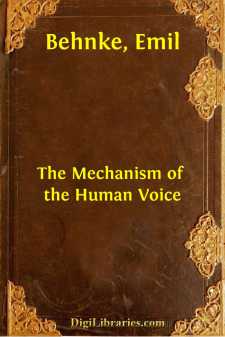Categories
- Antiques & Collectibles 13
- Architecture 36
- Art 48
- Bibles 22
- Biography & Autobiography 813
- Body, Mind & Spirit 142
- Business & Economics 28
- Children's Books 17
- Children's Fiction 14
- Computers 4
- Cooking 94
- Crafts & Hobbies 4
- Drama 346
- Education 46
- Family & Relationships 57
- Fiction 11829
- Games 19
- Gardening 17
- Health & Fitness 34
- History 1377
- House & Home 1
- Humor 147
- Juvenile Fiction 1873
- Juvenile Nonfiction 202
- Language Arts & Disciplines 88
- Law 16
- Literary Collections 686
- Literary Criticism 179
- Mathematics 13
- Medical 41
- Music 40
- Nature 179
- Non-Classifiable 1768
- Performing Arts 7
- Periodicals 1453
- Philosophy 64
- Photography 2
- Poetry 896
- Political Science 203
- Psychology 42
- Reference 154
- Religion 513
- Science 126
- Self-Help 84
- Social Science 81
- Sports & Recreation 34
- Study Aids 3
- Technology & Engineering 59
- Transportation 23
- Travel 463
- True Crime 29
The Mechanism of the Human Voice
by: Emil Behnke
Description:
Excerpt
INTRODUCTION.
We are living in an age which is singularly poor in fine voices, both male and female, and with regard to the tenors of the present time there is this additional misfortune, that, as a rule, their voices do not last, but are often worn out in a very few years; in many instances while their owners are still under training, and before they have had an opportunity of making their appearance in public. If we remember that there was a time when most beautiful and highly cultivated voices were so plentiful that even in comparatively small towns there were to be found Opera Companies consisting of excellent singers, we may well ask ourselves how this remarkable change for the worse has come about. People have attempted to account for it in various ways. Up to the middle of the last century women were forbidden by Ecclesiastical Law to take part in Church music. The voices of boys being available only for a very short time, means were taken to prevent their voices from breaking, and thus a class of male soprani and contralti was created, who made their first appearance in Rome in the beginning of the 17th century, and to these singers the education of the female voices was soon almost exclusively entrusted. In the middle of the last century, however, when women were permitted to participate in Church music, there was no longer any occasion to procure artificial female voices, and these singers gradually died out, though there were still some of them living and teaching in the beginning of the present century. According to Rossini, who certainly was eminently qualified to give an opinion on the subject, the decline of vocal art in these latter years is mainly due to the disappearance of this class of singers, and if it be true that henceforth the training of female voices was undertaken by tenors, who, being of course unable to give a true pattern to their pupils, treated the female organ according to their own very different registers, then it can easily be understood that many voices must have been ruined by the process, and the scarcity of distinguished female singers would thus be satisfactorily accounted for. But I fail to see in what way the disappearance of male soprani and contralti could possibly have affected tenors and basses.
Again, it is asserted that the way in which modern composers write vocal music is the cause of the evil. Certain it is that in the compositions of the old Italian masters the voice is studied, and nothing introduced which is hurtful or disadvantageous. Awkward intervals are avoided, no fatigue is caused, and everything is eminently singable; but the music is not always expressive of the sense of the words, which were clearly considered to be of minor importance. With our modern (and especially with the German) composers, it is just the opposite, their chief aim being thoroughly to enter, not only into the spirit of their text, but even into the slightest shade, the minutest detail of it, so as to make the music, as it were, a translation of their words into a higher kind of language. What, on the other hand, is possible or impossible for the voice is, since the time of Beethoven, but rarely considered; many composers, even the most distinguished ones, having evidently little knowledge of the most beautiful of instruments, for which they are nevertheless continually writing.
When one of the greatest living masters introduced the harp into his works, he wrote for it just as though it were a piano—i.e., as though it were to be played upon with the thumb and four fingers. But it so happens that on that instrument the fourth finger is never used. Consequently, when it came to the point harpists could not play that gentleman's compositions: they had first to re-write them. Here the composer, of course, was found out immediately, and he or any other man would have the same fate if he attempted to write for an instrument the properties of which he did not fully understand. But with the human voice the case is different....


